人教版九年级英语上册第5单元知识点梳理
最新新人教版九年级上册英语第五单元必考知识点归纳讲解学习
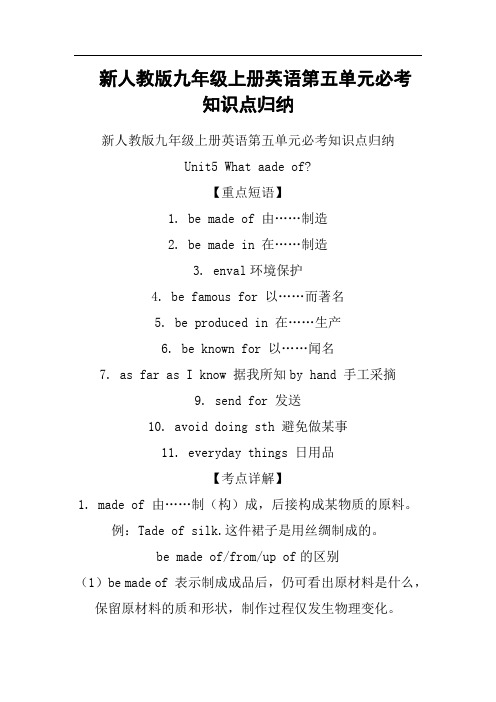
新人教版九年级上册英语第五单元必考知识点归纳新人教版九年级上册英语第五单元必考知识点归纳Unit5 What aade of?【重点短语】1. be made of 由……制造2. be made in 在……制造3. enval环境保护4. be famous for 以……而著名5. be produced in 在……生产6. be known for 以……闻名7. as far as I know 据我所知by hand 手工采摘9. send for 发送10. avoid doing sth 避免做某事11. everyday things 日用品【考点详解】1. made of 由……制(构)成,后接构成某物质的原料。
例:Tade of silk.这件裙子是用丝绸制成的。
be made of/from/up of的区别(1)be made of 表示制成成品后,仍可看出原材料是什么,保留原材料的质和形状,制作过程仅发生物理变化。
例:Tade of paper.风筝是用纸做的。
(2)be made from 表示制成的东西完全失去了原材料的外形或特征,或原材料在制作过程中发生化学变化,在成品中已无法辨认。
例:The paade from wood.纸是木头做的。
Buadlk. 黄油是从牛奶中提炼出来的。
(3)be made up of 用……构成或组成的,指人、物皆可,指结构成分。
例:Our class is made up of six groups. 我们班是由六个小组组成的。
2. Iat many people all over the world da.好像全世界的许多人都在喝中国茶。
句型“Iat…”意为“看起来好像/似乎……”,其中seem 是连系动词,意为“似乎;好像”,句型中的it是形式主语,不能用其他代词来替代。
例:Iat he was laain. 看来他没赶上火车。
九年级英语unit5知识点

九年级英语unit5知识点九年级英语Unit 5 知识点九年级英语的Unit 5涵盖了一些有趣的主题,让学生们在学习中能够扩展词汇、提高听力、阅读和写作技巧。
本文将从听力、语法和阅读三个方面来介绍Unit 5的核心知识点。
一、听力技巧在九年级英语中,听力是提高口语和理解能力的重要手段。
Unit 5的听力部分主要涉及到日常对话、电话沟通和旅行信息等方面。
学生们在听时需要注意以下几个技巧:1.注意听关键词和数字:在听对话时,要特别注意关键词和数字。
例如,在听旅游信息时,需要留意地点、价格、日期等关键词,这样才能更好地理解对话内容,回答问题。
2.留意语气和语调:语气和语调是判断对话中的情感和意图的重要线索。
学生们要试着区分对话中的开心、生气、惊讶等不同的语气和语调,才能真正理解对方的意思。
3.关注细节:对于长对话或完整的对话问答,学生们需要细心聆听,注意每个人说话的观点,并归纳整理出答案。
同时也要学会通过上下文的线索来推测未知词汇的意思。
二、语法知识Unit 5中的语法知识主要涉及时态和被动语态等方面。
以下是一些主要的语法知识点:1.一般现在时与一般过去时:在描述日常活动或习惯时,使用一般现在时;而谈论过去发生的事件时,则需要使用一般过去时。
例如:"She always goes to school by bus." (一般现在时) 和 "We visited the museum last week." (一般过去时)。
2.现在进行时:现在进行时表示正在发生的动作或现阶段正在进行的事情。
结构是"be + 动词的ing形式"。
例如:"I am studying for the exam" (我正在准备考试)。
3.被动语态:被动语态用来强调动作的承受者,而不是动作的执行者。
结构是"be + 过去分词"。
例如:"The book was written by Mark Twain." (这本书是马克·吐温写的)。
人教版九年级上册英语unit5知识点
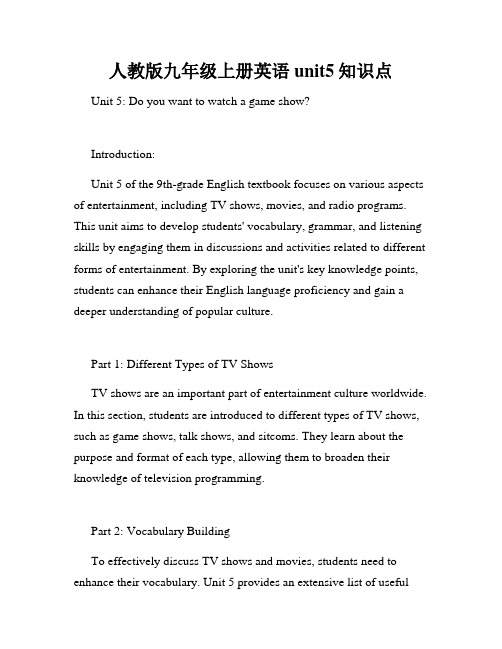
人教版九年级上册英语unit5知识点Unit 5: Do you want to watch a game show?Introduction:Unit 5 of the 9th-grade English textbook focuses on various aspects of entertainment, including TV shows, movies, and radio programs. This unit aims to develop students' vocabulary, grammar, and listening skills by engaging them in discussions and activities related to different forms of entertainment. By exploring the unit's key knowledge points, students can enhance their English language proficiency and gain a deeper understanding of popular culture.Part 1: Different Types of TV ShowsTV shows are an important part of entertainment culture worldwide. In this section, students are introduced to different types of TV shows, such as game shows, talk shows, and sitcoms. They learn about the purpose and format of each type, allowing them to broaden their knowledge of television programming.Part 2: Vocabulary BuildingTo effectively discuss TV shows and movies, students need to enhance their vocabulary. Unit 5 provides an extensive list of usefulwords and phrases related to entertainment. From adjectives that describe movies to verbs associated with TV watching, students learn how to express their preferences, opinions, and experiences in English.Part 3: Talking About PreferencesUnderstanding and expressing personal preferences is an essential skill in everyday life. This section introduces students to expressions and sentence structures used to discuss preferences when it comes to TV shows, movies, and other forms of entertainment. By engaging in role plays and group discussions, students can practice using these expressions in real-life scenarios.Part 4: Celebrity GossipCelebrity culture is a significant aspect of modern entertainment. Unit 5 provides an opportunity for students to develop their listening skills by listening to celebrity interviews and radio programs. By doing so, they learn about the lives of famous individuals and improve their ability to comprehend spoken English in a real-world context.Part 5: Writing a Film ReviewWriting is an essential skill that students need to cultivate in their English language learning journey. This section guides students inwriting film reviews, enabling them to express their opinions, critique movies, and provide recommendations. By engaging in this activity, students not only enhance their writing skills but also develop their analytical thinking abilities.Conclusion:Unit 5 of the 9th-grade English textbook offers a comprehensive exploration of various aspects of entertainment. By delving into different types of TV shows, building their vocabulary, discussing preferences, listening to celebrity interviews, and writing film reviews, students gain a well-rounded understanding of entertainment culture in the English-speaking world. These activities and discussions provide students with opportunities to improve their language skills, critical thinking abilities, and cultural awareness. As they progress through the unit, students become more proficient in expressing themselves in English and develop a deeper appreciation for the significance of entertainment in our lives.。
人教版九年级英语上册各单元知识点梳理
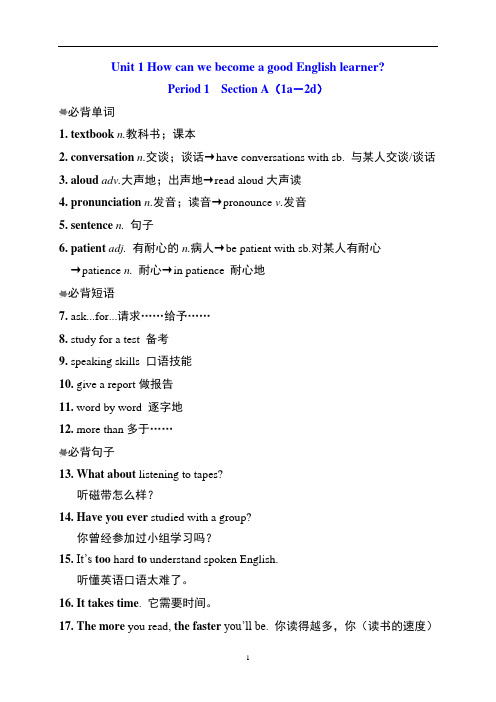
Unit 1 How can we become a good English learner?Period 1 Section A(1a-2d)必背单词1.textbook n.教科书;课本2.conversation n.交谈;谈话→have conversations with sb. 与某人交谈/谈话3.aloud adv.大声地;出声地→read aloud大声读4.pronunciation n.发音;读音→pronounce v.发音5.sentence n. 句子6.patient adj. 有耐心的n.病人→be patient with sb.对某人有耐心→patience n. 耐心→in patience 耐心地必背短语7. ask...for...请求……给予……8. study for a test 备考9. speaking skills 口语技能10. give a report做报告11. word by word 逐字地12. more than多于……必背句子13. What about listening to tapes?听磁带怎么样?14.Have you ever studied with a group?你曾经参加过小组学习吗?15.It’s too hard to understand spoken English.听懂英语口语太难了。
16. It takes time. 它需要时间。
17.The more you read, the faster you’ll be.你读得越多,你(读书的速度)就会越快。
Period 2 Section A(3a-3b)必背单词1. expression n.表情;表示;表达方式→express v.表达;表露→adj. 特快的→an express train 特快列车2.discover v. 发现;发觉→discovery n.发现→discoverer n. 发现者3.secret n.秘密;秘诀→keep a secret保守秘密→the secret to/of success成功的秘密→secret adj.秘密的;保密的→secret news 秘闻4. grammar n.语法必背短语5. be afraid to do sth.不敢做某事→be afraid of doing sth.害怕做某事6. because of 因为7. fall in love with 爱上……8. look up (在词典或参考书中)查阅;抬头看→look it /them up查阅它/它们→look up to sb.仰慕某人=admire sb.必背句子9. The teacher spoke so quickly that I did not understand her most of the tim老师说得太快,以至于很多时候我都听不懂她(说的话)。
人教版英语九年级1—5单元重点短语及用法
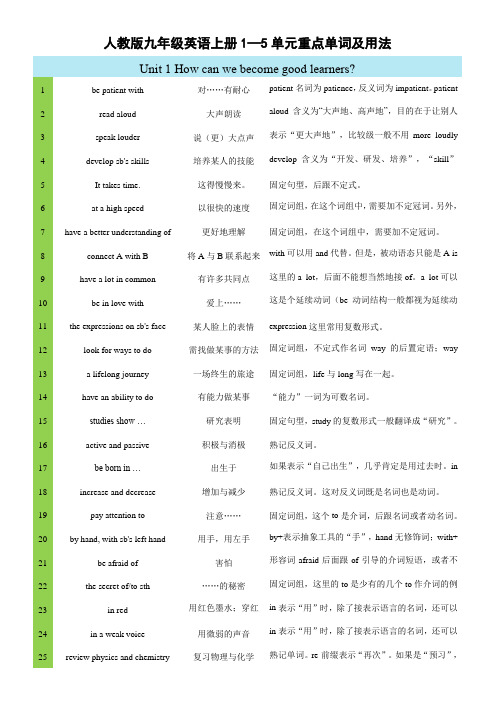
人教版九年级英语上册1—5单元重点单词及用法Unit 1 How can we become good learners?1 be patient with 对……有耐心patient名词为patience,反义词为impatient。
patient2 read aloud 大声朗读aloud含义为“大声地、高声地”,目的在于让别人3 speak louder 说(更)大点声表示“更大声地”,比较级一般不用more loudly4 develop sb's skills 培养某人的技能develop含义为“开发、研发、培养”,“skill”5 It takes time. 这得慢慢来。
固定句型,后跟不定式。
6 at a high speed 以很快的速度固定词组,在这个词组中,需要加不定冠词。
另外,7 have a better understanding of 更好地理解固定词组,在这个词组中,需要加不定冠词。
8 connect A with B 将A与B联系起来with可以用and代替。
但是,被动语态只能是A isconnected with B9 have a lot in common 有许多共同点这里的a lot,后面不能想当然地接of。
a lot可以something nothing10 be in love with 爱上……这是个延续动词(be动词结构一般都视为延续动fall in love with11 the expressions on sb's face 某人脸上的表情expression这里常用复数形式。
12 look for ways to do 需找做某事的方法固定词组,不定式作名词way的后置定语;way13 a lifelong journey 一场终生的旅途固定词组,life与long写在一起。
14 have an ability to do 有能力做某事“能力”一词为可数名词。
人教版九年级英语上册各单元知识点归纳总结
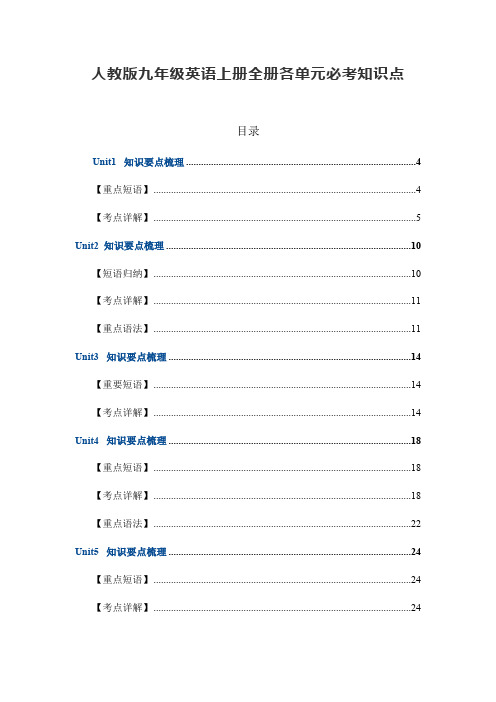
人教版九年级英语上册全册各单元必考知识点目录Unit1 知识要点梳理 (4)【重点短语】 (4)【考点详解】 (5)Unit2 知识要点梳理 (10)【短语归纳】 (10)【考点详解】 (11)【重点语法】 (11)Unit3 知识要点梳理 (14)【重要短语】 (14)【考点详解】 (14)Unit4 知识要点梳理 (18)【重点短语】 (18)【考点详解】 (18)【重点语法】 (22)Unit5 知识要点梳理 (24)【重点短语】 (24)【考点详解】 (24)【重点语法】 (27)Unit6 知识要点梳理 (30)【重点短语】 (30)【考点详解】 (30)【重点语法】 (33)Unit1 知识要点梳理【重点短语】1. have conversation with sb. 同某人谈话2. too…to… 太……而不能3. the secret to… ……的秘诀4. be afraid of doing sth./ be afraid to do sth. 害怕做某事5. look up 查阅6. repeat out loud 大声跟读7. make mistakes in 在……方面犯错误8. connect ……with… 把……和……连接/联系起来9. get bored 感到厌烦10. be stressed out 焦虑不安的11. pay attention to 注意;关注12. depend on 取决于;依靠13. the ability to do sth.. 做某事的能力【考点详解】1. by + doing 通过……方式(by是介词,后面要跟动名词,也就是动词的ing 形式)2. talk about 谈论,议论,讨论The students often talk about movie after class. 学生们常常在课后讨论电影。
talk to sb= talk with sb 与某人说话3. 提建议的句子:①What/ how about +doing sth.? 做…怎么样?(about后面要用动词的ing形式,这一点考试考的比较多)如:What/ How about going shopping?②Why don't you + do sth.? 你为什么不做…?如:Why don't you go shopping?③Why not + do sth. ? 为什么不做…?如:Why not go shopping?④Let's + do sth. 让我们做…...吧。
人教版九年级英语Unit 5知识点总结
人教版九年级英语Unit 5知识点总结Unit 5 Knowledge Points Summary of the 9th Grade English TextbookIntroduction:The English textbook for the ninth grade includes a comprehensive collection of knowledge points in Unit 5. This unit covers a wide range of topics, including food, healthy lifestyles, and cultural differences. In this article, we will delve deeper into the various aspects of Unit 5, providing a detailed summary and analysis.Food and Healthy Lifestyles:The unit begins by introducing different types of food and their nutritional value. It emphasizes the importance of a balanced diet and encourages students to make healthy choices. Additionally, the unit explores various eating habits and customs around the world, promoting cultural understanding and diversity.An important topic covered in Unit 5 is the relationship between diet and health. It highlights the consequences of an unhealthy diet, such as obesity and related health issues. Moreover, the unit providesuseful information on how to maintain a healthy lifestyle, including regular exercise and the consumption of fresh fruits and vegetables.Cultural Differences:Unit 5 also delves into cultural differences related to food and eating habits. It investigates how people from various countries have distinct ways of preparing and consuming food. This section allows students to appreciate diverse cultures and broaden their understanding of global culinary traditions.Furthermore, the unit explores table manners and dining etiquette around the world. By comparing and contrasting different cultural norms, students gain insights into the importance of respecting and adapting to various social customs.Sustainable Development:Unit 5 goes beyond personal health and explores the concept of sustainable development. It introduces the United Nations' Sustainable Development Goals (SDGs) and emphasizes the role individuals play in achieving a sustainable future. This section encourages students to become responsible global citizens who are aware of environmental issues and strive to make a positive impact.Proverbs and Idioms:The unit incorporates a selection of proverbs and idioms, which not only enhance students' understanding of the English language but also provide valuable insights into cultural wisdom. It encourages students to use these expressions in daily conversations, thus improving their language proficiency and enriching their communication skills.In addition to language practice, the inclusion of proverbs and idioms helps students understand the cultural context in which English is used. It encourages them to appreciate the nuances and richness of the language, while also expanding their knowledge of various cultural backgrounds.Conclusion:Unit 5 of the ninth-grade English textbook covers a diverse range of topics, including food, healthy lifestyles, cultural differences, sustainable development, and language enrichment. By exploring these subjects, students not only improve their language skills but also develop a broader perspective on global issues.Through the exploration of food and healthy lifestyles, students understand the importance of nutrition and learn how to make healthy choices. The study of cultural differences fosters appreciation for diversity and enhances intercultural understanding. Additionally, the unit encourages students to take responsibility for sustainable development and become active contributors to a better future.Furthermore, the incorporation of proverbs and idioms deepens students' understanding of the English language and exposes them to cultural wisdom. This holistic approach to language learning enables students to become proficient speakers while also broadening their knowledge of different cultures.In conclusion, Unit 5 of the ninth-grade English textbook offers a comprehensive and engaging learning experience. By connecting language skills with real-world topics, students not only improve their language proficiency but also develop a global outlook and cultural sensitivity.。
九年级上册英语知识点Unit5
九年级上册英语知识点Unit5 Unit 5 of the ninth-grade English textbook covers various essential knowledge points, and it plays a crucial role in enhancing students' English proficiency. In this article, we will discuss the key concepts and skills covered in Unit 5.Vocabulary Skills:Vocabulary acquisition is a fundamental aspect of language learning. In Unit 5, students are introduced to words related to leisure activities, such as "hobby," "interest," "pastime," and "excursion." These terms enable students to express their preferences and discuss their leisure time effectively.Grammar:Grammar is the backbone of any language. Unit 5 focuses on the review and reinforcement of the present continuous tense, using it to describe future arrangements and activities. Understanding how to form and use this tense is essential for clear communication.Listening and Speaking:Unit 5 presents learners with various activities to improve their listening and speaking skills. Students listen to dialogues andconversations focusing on leisure activities, which helps them develop their ability to understand spoken English. Moreover, they engage in pair and group discussions, allowing them to practice expressing their opinions and ideas about hobbies and leisure activities confidently.Reading Comprehension:The reading texts in Unit 5 are carefully selected to provide students with a chance to practice their reading comprehension skills. They are exposed to different types of texts, including articles, advertisements, and short stories. These reading materials not only expand students' vocabulary but also enhance their understanding of sentence structures and overall reading comprehension.Writing:Unit 5 also emphasizes the importance of developing writing skills. Students are encouraged to write about their personal interests and hobbies, using the target language accurately and creatively. Through various writing tasks, students learn to express themselves effectively in writing, improving their overall language proficiency.Cultural Awareness:In addition to language skills, Unit 5 also aims to broaden students' horizons by introducing them to different cultures. Students have the opportunity to explore the leisure activities and traditions of people from various countries, promoting cultural exchange and fostering an appreciation for diversity.Critical Thinking:Unit 5 incorporates critical thinking skills, encouraging learners to analyze, evaluate, and interpret information. By engaging with the texts and tasks provided, students develop their ability to think critically, enabling them to make logical connections, draw conclusions, and express their opinions effectively.Self-Assessment and Reflection:Throughout Unit 5, students are given opportunities for self-assessment and reflection. They are encouraged to analyze their strengths and weaknesses in English learning, set realistic goals, and track their progress. This self-reflection helps students become more self-aware and responsible learners.In conclusion, Unit 5 of the ninth-grade English textbook covers a range of essential knowledge points and skills. From vocabulary acquisition to listening and speaking practice, from readingcomprehension to writing tasks, this unit offers a comprehensive learning experience. It not only focuses on language proficiency but also promotes cultural awareness, critical thinking, and self-assessment. Mastering the content in Unit 5 is crucial for students to enhance their English abilities and become effective communicators.。
人教版九年级英语unit5全单元课件
Translation:
1.属于 1.belong to 2.古典音乐 2.classical music 3.实在太….. 3.much too 4.在约会 4.at an appointment 5.占据,构成…. 5.make up 6.期末考试 6.final exam 7.由于,因为….. 7.because of sth. 8.给…的礼物 8.a present for… 9.赶(班)车 9.catch the bus
7.appointment: n 约会,约定 have an ~/ make an ~ with sb 8. crucial: adj. 至关重要的
~ time/~ points be ~ to sb 对某人至关重要 The result is ~to everyone. It’s ~ that … 至关重要的是… It's crucial that we get this right.
have a ~ 野餐 at the picnic野餐中
4 wear a hair band系一条发带 5. possible: adj. 可能的 as… as possible 尽可能地 possibly: adv. 可能地 It will possibly be an engineer in ten years.十年后我可能成为一名工程 师。
11 anxious: adj 1)焦虑不安的 be anxious about/for sth I'm anxious about her safety.我对她的安 全担心。 同义: be worried about/worry about 2) be anxious to do sth 渴望做某事
人教版英语9年级上册第5单元Unit5 sectionA知识点总结
be good for be good to
对……有好处 对……好
be good at
擅长
be good with
和……相处好
everyday adj. 每天的;日常的 后跟名词不能单独使用 every day 每天; 副词短语 作时间状语,独立使用
1. 多吃水果对健康有好处。
_E__a_ti_n_g__ more fruit__i_s__ _g_o_o_d__ _f_o_r__ health.
2. grass and leaves.
leaf
树叶
复数 ------leaves
以f 或者fe 结尾的名词变复数时,把f 或 fe 变成v, 再加es.
wolf---- wolves
self----__se_l_v_e_s___
shelf----__s_h_e_lv_e_s__ wife----__w__iv_e_s___
The tree was planted by us.
注:后面能接宾语的动词才有被动语态
被动语态的结构
be + P.P.
一现 am / is / are +p.p. 一过 was /were +p.p. 一将 will be +p.p. 过将 would be +p.p. 过完 have / has +been+ p.p. 现完 had + been+ p.p. 现进 am /is / are being +p.p. 过进 was /were being +p.p. 情V 情V+be+p.p.
1. be made of 2. be made from 3. be made in … 4. be made into… 5. avoid doing sth. 6. as far as I know 7. be famous/ known for 8. be famous/ known as 9. be produced in 10. no matter 11. everyday 12. every day
- 1、下载文档前请自行甄别文档内容的完整性,平台不提供额外的编辑、内容补充、找答案等附加服务。
- 2、"仅部分预览"的文档,不可在线预览部分如存在完整性等问题,可反馈申请退款(可完整预览的文档不适用该条件!)。
- 3、如文档侵犯您的权益,请联系客服反馈,我们会尽快为您处理(人工客服工作时间:9:00-18:30)。
Unit5 知识要点梳理
【重点短语】
1. be made of 由……制造
2. be made in 在……制造
3. environmental protection 环境保护
4. be famous for 以……而著名
5. be produced in 在……生产
6. be known for 以……闻名
7. as far as I know 据我所知
8. pick by hand 手工采摘
9. send for 发送
10. avoid doing sth 避免做某事
11. everyday things 日用品
【考点详解】
1. made of 由……制(构)成,后接构成某物质的原料。
例:This skirt is made of silk.这件裙子是用丝绸制成的。
be made of/from/up of的区别
(1)be made of 表示制成成品后,仍可看出原材料是什么,保留原材料的质和形状,制作过程仅发生物理变化。
例:The kite is made of paper.风筝是用纸做的。
(2)be made from 表示制成的东西完全失去了原材料的外形或特征,或原材料在制作过程中发生化学变化,在成品中已无法辨认。
例:The paper is made from wood.纸是木头做的。
Butter is made from milk. 黄油是从牛奶中提炼出来的。
(3)be made up of 用……构成或组成的,指人、物皆可,指结构成分。
例:Our class is made up of six groups. 我们班是由六个小组组成的。
2. It seems that many people all over the world drink Chinese tea.
好像全世界的许多人都在喝中国茶。
句型“It seems that…”意为“看起来好像/似乎……”,其中seem是连系动词,意为“似乎;好像”,句型中的it是形式主语,不能用其他代词来替代。
例:It seems that he was late for the train. 看来他没赶上火车。
seem的几种常见结构:
(1)seem to do sth此句型可与“It seems that…”转换。
例:They seem to find the way to the cinema. =It seems that they find the way to the cinema.
他们似乎找到了去电影院的路了。
(2)seem+形容词
例:My temperature seems (to be) all right. 我的体温看上去正常了。
(3)seem+名词
例:That seems not a bad idea. 看上去主意不错。
3. When the leaves are ready, they are picked by hand and then are sent for processing in factory.
当茶叶成熟时,就被用手工采摘然后送到工厂加工。
此句是由when 引导的时间状语从句,are picked, are sent都是一般现在时的被动结构。
例:When the fruit are ready, they are picked and are sent to the market for sale.
当这些水果成熟后就被摘下来并送到市场上卖掉。
4. No matter what you may buy, you might think those products were made in those countries.
无论你买什么,你都可能认为那些产品是在那些国家生产的。
此句为由"no matter +特殊疑问词"引导让步状语从句。
意为“无论….”,相当于whatever。
例:No matter what I said to her, she still didn’t believe me.
无论我对她说什么,她仍然不相信我。
5. find out, 查出,找到。
例:The police are trying to find out where the boy got off the train.
警察正在查找这个男孩是从哪下的火车。
find,find out和look for都含有“寻找、找到”的意思,但其含义和用法却不同。
①find意为“找到、发现”,通常指找到或发现具体的东西,强调的是找的结果。
Will you find mea pen? 你替我找支钢笔好吗?
②look for意为“寻找”,是有目的地找,强调“寻找”这一动作。
例:I’m looking for my pen everywhere. 我正到处找我的钢笔。
He is looking for his shoes. 他在找他的鞋子。
③find out意为“找出、发现、查明”,多指通过调查、寻问、打听、研究之后“搞清楚、弄明白”,通常含有“经过困难曲折”的含义,指找出较难找到的、无形的、抽象的东西。
例:Please find out when the train leaves. 请查一下火车什么时候离站。
Read this passage,and find out the answer to this question.
【重点语法】
一般现在时的被动语态
一. 概念理解
1. 时态:在英语语言中,时态主要讨论行为动词发生的时间。
如:He often helps me with my English. 他经常帮助我学英语。
(help这个动作经常发生often;故用一般现在时)
2. 语态:在英语语言中,语态主要讨论句子主语与行为动词的关系。
语态有两种:主动语态和被动语态。
①主语是动作的发出者(执行者)为主动语态。
如:The tall boy often hits his classmates (主语boy是谓语动词hit的发出者)。
②主语是动作的接受者(承受者)为被动语态。
汉语中常用“被”、“给”、“由”、“受”等词用来表示被动,而英语用:助动词be + 及物动词的过去分词构成
如:Chinese is spoken by the most people in the world(主语Chinese 是谓语动词speak的承受者)。
3. 语态与时态的关系:在任何一个英语句子中都同时存在语态和时态,他们是分析一个英语句子的两个主要元素。
如:①He is looking after his sister at home. (此句为现在进行时的主动语态结构)
②He is being looked after well by his parents. (此句为现在进行时的被动语态结构)
二. 被动语态最基本的句型结构:be +及物动词过去分词
说明:①be 有时态,人称和数的变化。
②被动语态中的谓语动词必须是及物动词;因为被动句中的主语是动作的承受者,某些短语动词如look after, think of, take care of, work out, laugh at等,也可用于被动语态。
三. 被动语态的使用
1. 当不知道或没有必要指出动作的执行者时,常用被动语态,这时往往不用by 短语。
Mr. White, the cup with mixture was broken after class. (只是告诉老师杯子坏了,不知是谁弄坏的,或不想说出谁弄坏的)。
2. 突出或强调动作的承受者,如果需要说出动作的执行者,用by 短语。
如:The cup was broken by Paul.
四. 主动语态变被动语态的变法:主动语态与被动语态之间如何转换
1. 把主动语态的宾语变成被动语态的主语。
2. 把主动语态的谓语变成被动语态的be + 过去分词,时态要与原句保持一致。
3. 把主动语态的主语变为介词by的宾语,放在被动语态里谓语动词之后,by 短语可以省略。
如果原句主语是地点名词,在被动语态中用in + 地点名词作状语。
五. 一般现在时的被动语态:am /is/ are +done
如:Tea is grown in Hangzhou. 杭州种植茶叶。
